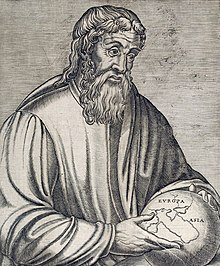Strabon
| Strabo | |
|---|---|

Strabo as depicted in a 16th-century engraving
|
|
| Born | 64 or 63 BC |
| Died | c. 24 AD (aged about 87) |
| Occupation |
|
Strabo (/ˈstreɪboʊ/; Greek: Στράβων Strabōn; 64 or 63 BC – c. 24 AD) was a Greek geographer, philosopher, and historian who lived in Asia Minor during the transitional period of the Roman Republic into the Roman Empire.
Strabo was born to an affluent family from Amaseia in Pontus (modern Amasya, Turkey), a city that he said was situated the approximate equivalent of 75 km from the Black Sea. Pontus had recently fallen to the Roman Republic, and although politically he was a proponent of Roman imperialism, Strabo belonged on his mother's side to a prominent family whose members had held important positions under the resisting regime of King Mithridates VI of Pontus.
Strabo's life was characterized by extensive travels. He journeyed to Egypt and Kush, as far west as coastal Tuscany and as far south as Ethiopia in addition to his travels in Asia Minor and the time he spent in Rome. Travel throughout the Mediterranean and Near East, especially for scholarly purposes, was popular during this era and was facilitated by the relative peace enjoyed throughout the reign of Augustus (27 BC – AD 14). He moved to Rome in 44 BC, and stayed there, studying and writing, until at least 31 BC. In 29 BC, on his way to Corinth (where Augustus was at the time), he visited the island of Gyaros in the Aegean Sea. Around 25 BC, he sailed up the Nile until reaching Philae, after which point there is little record of his proceedings until AD 17.
...
Wikipedia
